Planning an event, whether virtual or physical, can be extremely hectic. From reaching out to speakers and managing vendors to ticketing and handling attendee registrations, it’s no walk in the park.
The right software can simplify the process and help you coordinate and execute your events more effectively.
This article will explore the different types of event management tools, their key features, and how to choose the best one for your needs. Let’s dive in!
Explore our dedicated article to learn about event booking software.
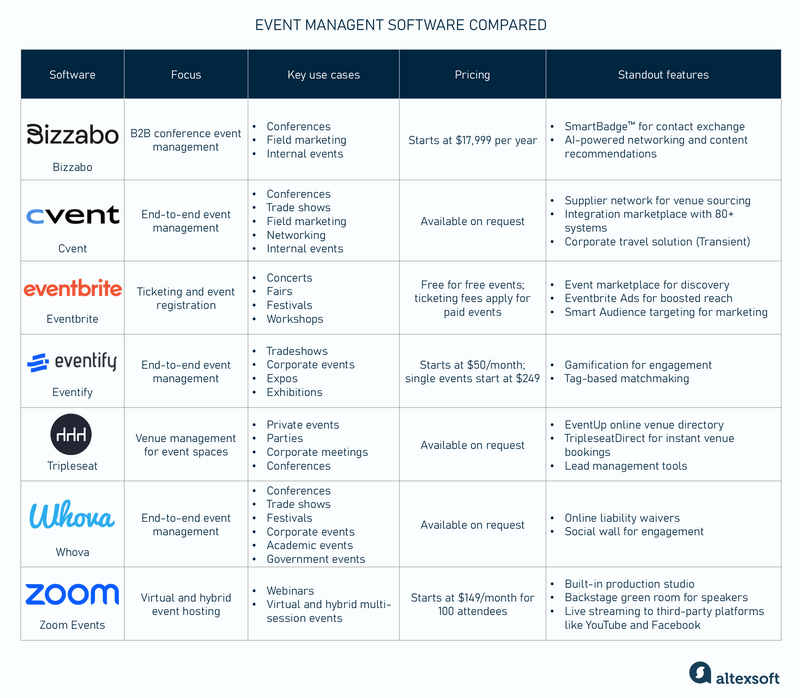
What is event management software?
Event management software (EMS) is a digital tool that helps event organizers plan, coordinate, and execute events, whether international conferences, corporate retreats, destination trade shows, charity auctions, incentive travel programs, or virtual seminars.
When used in the travel context, EMS benefits the MICE (Meetings, Incentives, Conferences, and Exhibitions) tourism sector and helps hotels and venues boost revenue by automating various aspects of event management, like registration, ticketing, scheduling, attendee sign-in, marketing, and more.
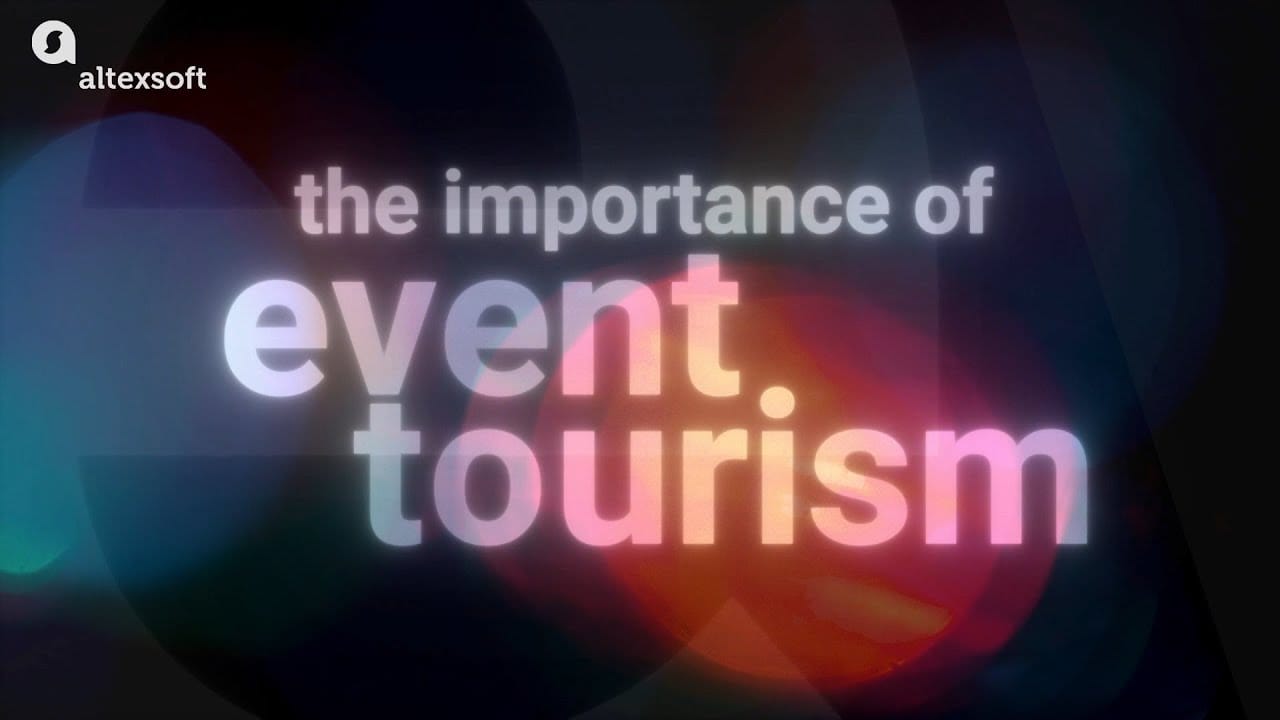

Event management software features
There are core functionalities commonly found in most event management platforms. Let's explore these features.
Registration and ticketing. EMS offers online registration forms for easy signups and handles ticket sales and sign-in. Many EMS integrate with a payment gateway, enabling participants to pay for tickets online.
Event website builder. A well-designed website is a primary hub containing information about key event details, the registration process, schedules, ticketing options, etc. EMS platforms typically have website builders with customizable templates that help set the tone for the event.
Event mobile app. EMS usually comes with customizable mobile apps that give participants on-the-go access to all event information from the comfort of their smartphone or tablet. With this, event planners can send push notifications containing real-time updates directly to attendees’ devices.
Marketing functionalities. EMS includes marketing tools to promote events through email campaigns, social media integration, and automated follow-ups. These features ensure that the information reaches the right audience and maximizes attendance.
Attendee management. Features, like badge printing, check-in management, and segmentation based on attendee preferences, help organizers track registrations and arrange guest lists.
Agenda management. EMS allows organizers to create detailed schedules, send reminders, and adjust session timings from one interface.
Speaker management. This module helps coordinate keynote speakers, panelists, and moderators. It assists with speaker onboarding, profile creation, session assignments, and presentation uploads. It also provides a dashboard for uploading slides and receiving audience feedback.
Reporting and analytics. Data-driven insights help event organizers measure success and make informed decisions. EMS provides dashboards with key metrics like ticket sales, attendee demographics, engagement levels, and ROI.
Article carousel:
How to choose event management software
Here are some key factors to consider when deciding which event management software to use.
Event needs. Begin by clearly defining the nature and scope of your events. End-to-end platforms are well suited to handle large-scale conferences and meetings since these solutions cover everything from registration and ticketing to agenda management, virtual streaming, and post-event analytics. However, if it's a smaller event (e.g., a 50-person workshop or a local meetup), you can use an EMS that focuses on specific aspects of event planning, like ticketing or attendee management, or buy the necessary modules from end-to-end solutions since they usually have a modular structure.
Also, make sure that the tool supports the format of the events you’ll run—in-person, virtual, hybrid, or webinars.
Cost consideration. While it’s tempting to go for the cheapest option, choosing the EMS that gives you the best bang for your money is more important. Look for software that offers a balance between affordability and functionality. Also, review the costs of add-on services and their pricing models, whether subscription-based, one-time licenses, pay-per-event, etc.
Ease of use. The software usability is key for your team and event participants. The ideal solution should be easy to navigate without extensive training and cater to the experience of all users: organizers, attendees, speakers, and other stakeholders.
Customer support. Evaluate the support channels available, like live chat, phone, or email. Also, consider whether the support is 24/7 and in real-time, as this can make all the difference, especially for events operating across time zones.
Ease of integrations. Consider whether the software can integrate with other tools and platforms you already use or will need, including email marketing systems, CRMs, and payment processors. Robust integration options can simplify your workflow and improve information sharing across systems.
Feedback and analytics. A solid EMS platform should include reporting and analytics tools to help you gain actionable insights into attendee engagement, session popularity, and overall satisfaction. It should also allow you to receive feedback through real-time polls and survey forms.
Event management software examples
For this overview of event management software examples worth considering for future events, we’ve highlighted 7 solutions ranging from comprehensive all-in-one software to those that cater to specific aspects of event planning.
Our criteria for curating this list centered around the features they offer, reach in the event management industry, and customer reviews.
Please note: We do not promote any of the software listed below and only show them as examples and for educational purposes.
Bizzabo: B2B conference platform with smart badges and AI recommendations
Bizzabo’s Event Experience OS is designed to run, scale, market, and analyze B2B conferences. Besides software, the company provides a range of project management, production, and creative services.
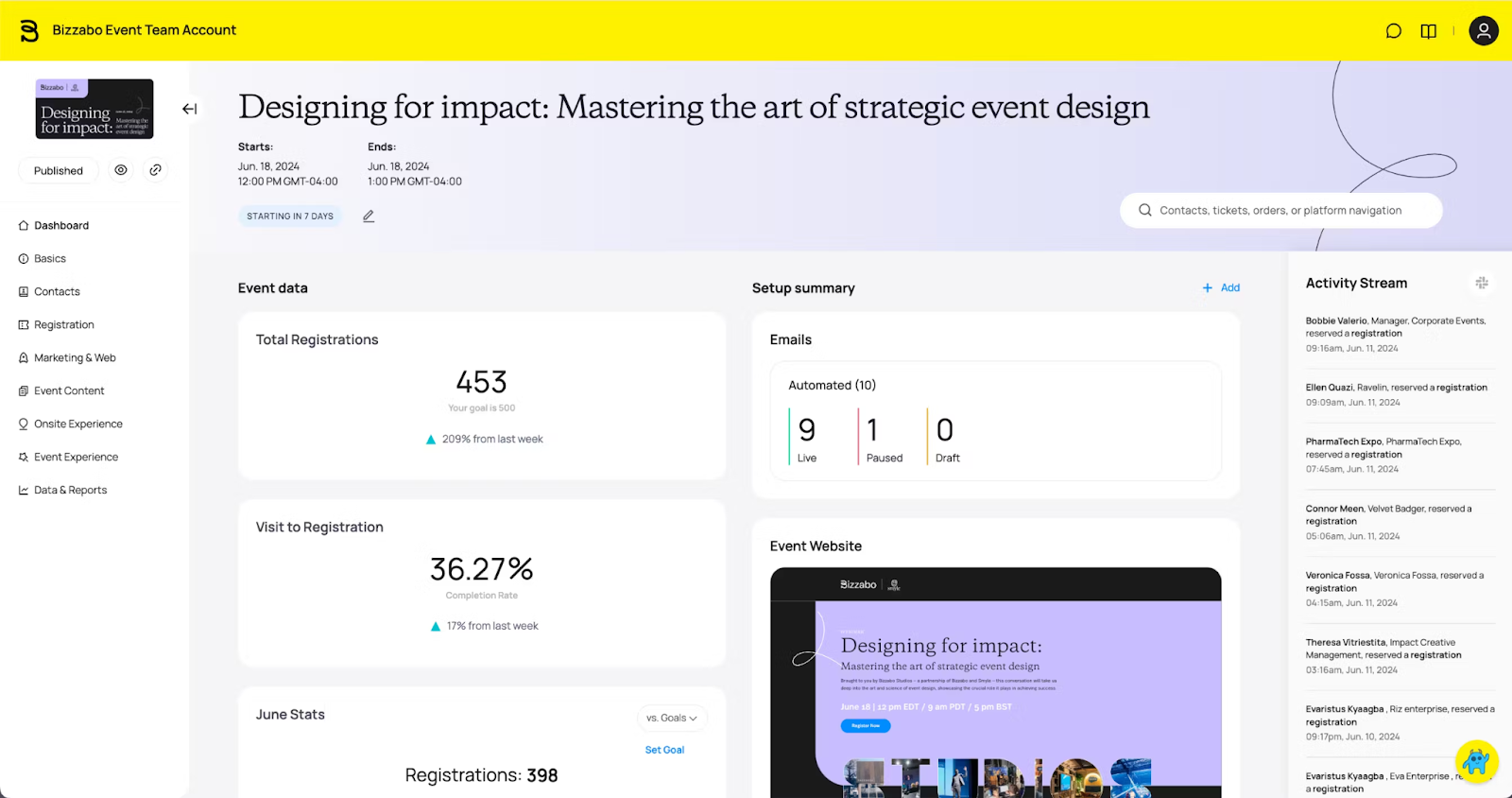
Bizzabo event team account. Source: Bizzabo
Unique features. Many EMS have event badges. However, Bizzabo’s SmartBadge takes things to the next level. It has a click-to-connect technology that allows attendees of in-person events to exchange contact information with a simple click of their badges, eliminating the need for business cards.
There’s also the AI engine that uses your event data to give participants personalized recommendations on people to network with and the best event content to consume.
Use cases. Bizzabo is used by over 700 brands worldwide to handle conferences, field marketing, and internal events in any format (in-personal, virtual, hybrid, and webinar).
Pricing. Event Experience OS starts at $17,999 per year and is billed annually. It covers all the tools you need to run large-scale conferences, webinars, etc. The pricing for other solutions and add-ons is available on request.
Cvent: Enterprise-grade event planning with deep integrations
Cvent covers every step of the event management process, from finding the perfect venue to analyzing metrics. It’s a strong contender if you’re looking for a platform that can handle the complexities of large-scale events while still being user-friendly.
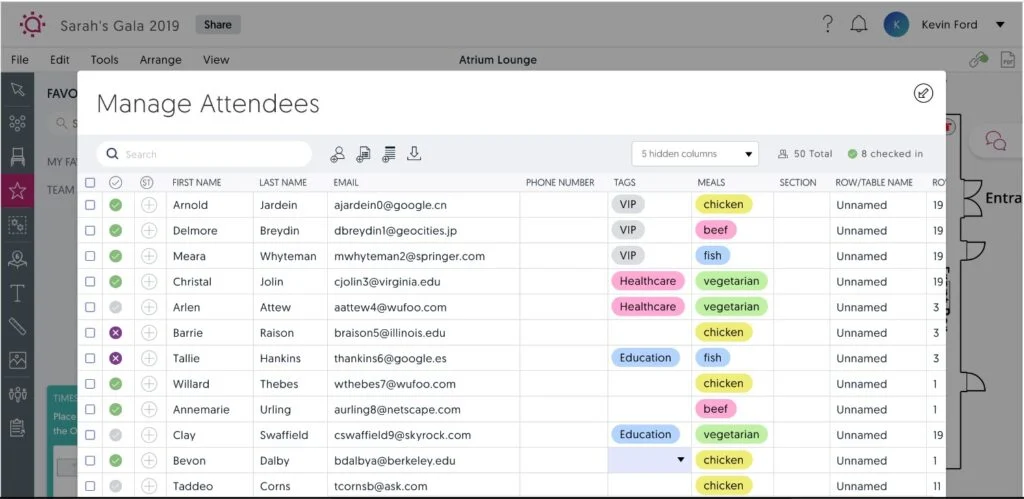
Cvent attendee management dashboard. Source: The Hotel GM
Unique features. Cvent runs an app marketplace featuring integrations with over 80 systems, including sales and marketing tools (Salesforce, HubSpot), global distribution systems (Amadeus, Sabre, and Travelport), corporate travel management platforms (Egencia, AmTrav), travel and expense management solutions (Navan, SAP Concur), translation software (Wordly), and more.
Cvent's supplier network allows event planners to choose from over 300,000 hotels and venues. It also helps hotels and venues attract, manage, and grow their revenue from corporate travel with Transient, which simplifies responding to corporate RFPs (Request for Proposals) and managing rates.
Use cases. Cvent’s vast integration marketplace and supplier network along with robust planning and analytics tools make it a good fit for conferences, trade shows, networking, and internal events across various sectors. The platform supports in-person, virtual, and hybrid formats as well as webinars.
Pricing. Cvent’s pricing is available on request. Note that Cvent uses a combined pricing structure (annual license fee + per registrant fee) and offers additional services that come with a separate charge.
Eventbrite: Ticketing and marketing for small to mid-sized events
Eventbrite is a ticketing and marketing platform that helps plan, create, promote, and monitor events, especially small to medium-sized ones, in over 180 countries. It also captures different types of payments and automates refunds. At the same time, the tool lacks the capabilities of end-to-end event management solutions, covering only particular stages of the entire process.
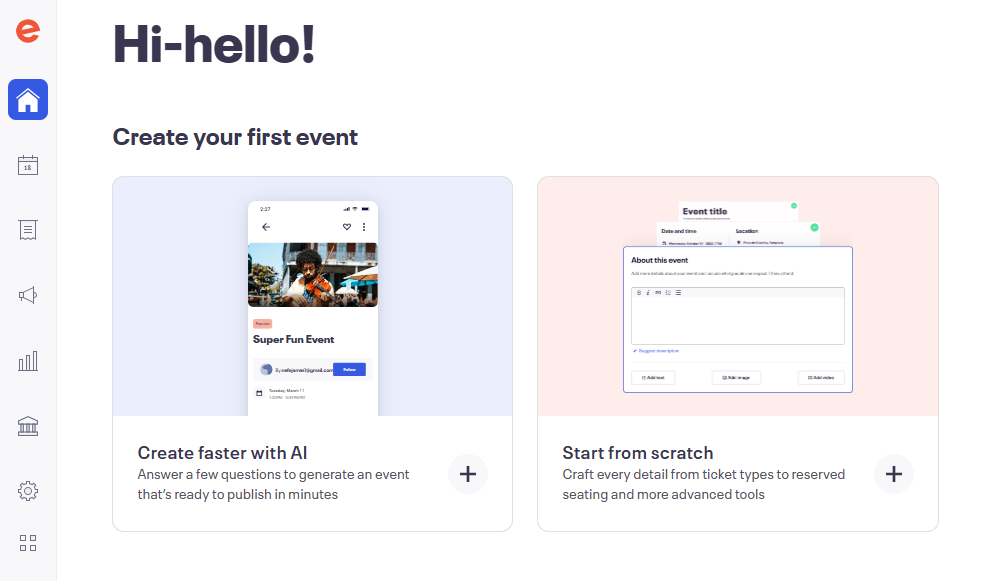
Unique features. Marketing is where the platform shines. Once you create an event, it's automatically added to the Event Marketplace, making it visible to a large audience. You can take things further and boost sales with Eventbrite Ads, which promotes your event to people within a 50-mile radius looking for similar experiences. This potentially can give you up to 14 times more exposure. Smart Audience, another marketing feature, uses Evenbrite’s proprietary data to target attendees who are interested in events like yours.
Use cases. Eventbrite works for online and offline concerts, workshops, festivals and fairs, conferences, and corporate meetings, providing that they simply need an easy-to-use platform for ticket sales, marketing, and engaging attendees.
Pricing. Eventbrite allows you to create and promote free events at no cost. Otherwise, it charges ticketing fees which are a combination of the service fee and payment processing fee. The platform also offers pro plans that start at $15/month for greater event management and promotion capabilities. Nonprofits can apply for a 50% discount on the pro plans.
Eventify: Gamification and matchmaking for enhanced attendee engagement
Eventify is another end-to-end EMS handling every aspect of events and conferences, from registration to analytics.
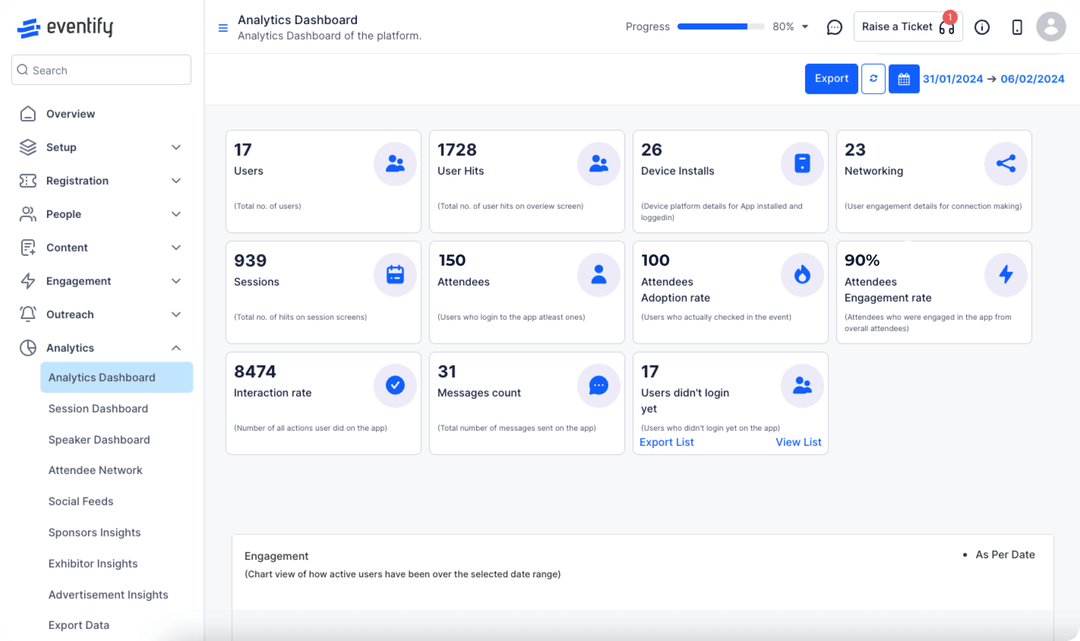
Unique features. Eventify’s gamification feature is designed to boost attendee engagement by turning routine activities into fun, interactive challenges. It allows you to incorporate game-like elements such as points, leaderboards, and rewards.
There’s also the tag-based matchmaking system, which helps attendees link with the most relevant people at an event by recommending connections based on shared interests.
Use cases. The platform supports in-person, virtual, and hybrid events in various industries, including healthcare, travel and tourism, nonprofits, and education.
Pricing. Eventify offers two pricing models: monthly subscriptions and single event fees. Subscriptions start at $50 per month when billed annually, and single events begin at $249 per event.
Tripleseat: Venue-focused platform for managing bookings and spaces
Unlike event management systems we reviewed earlier, Tripleseat targets venues like restaurants, bars, and hotels looking to manage, promote, sell, and market their spaces. It provides the standard features every other EMS does, including ticketing, analytics, and lead forms.
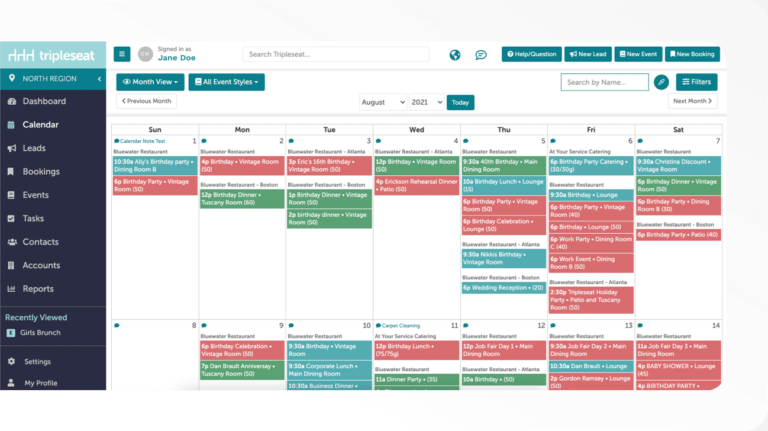
Unique features. Tripleseat helps venue owners showcase their spaces on EventUp, its online venue directory and marketing platform. The module connects venues with event planners who are searching for the perfect space for increased leads and visibility. There’s also TripleseatDirect, which removes friction in the reservation process by allowing customers to self-book venues. Instead of managing endless calls and emails, customers can see availability days and times on a venue’s calendar and book instantly.
Use cases. Tripleseat’s target market includes venues that want a single platform for managing bookings and events in their spaces while increasing sales.
Pricing. Tripleseat’s pricing is available on request. The final amount depends on the number of locations you want to manage and whether you need any of its add-on services.
Whova: All-in-one platform with waiver templates and content slideshow
Whova is an end-to-end event management software for orchestrating all aspects of an event from website building, registration, and check-in to lead capturing and ROI reporting. It has won several awards, with the most recent being the prestigious Silver People’s Choice Award for Favorite Event Technology Supplier.

Unique features. Being an all-in-one solution, Whova provides standard features you can expect to see in any EMS. However, it also comes with unique functionalities. Its online liability waiver solution provides editable templates of waivers attendees fill out and sign to protect organizers from liabilities. This can be necessary if, for example, you need the guests’ consent to use their images in your marketing materials or their acknowledgment of event rules.
Whova also boosts engagement with its social wall, which displays a slideshow of content — sponsor messages, announcements, event photos, and session updates — from your account.
Use cases. Whova’s clientele includes event organizers and planners across various sectors who require a comprehensive platform to manage in-person, virtual, and hybrid events. It has been used for conferences, trade shows, festivals, corporate, academic, and government events.
Pricing. Whova’s pricing info is only available on request.
Zoom Events: Virtual and hybrid event hosting with live-streaming
Zoom Events is an extension of Zoom’s popular video conferencing platform tailored specifically for hosting virtual and hybrid events. Besides providing standard features, Zoom Events’ live streaming infrastructure ensures high-quality audio and video.
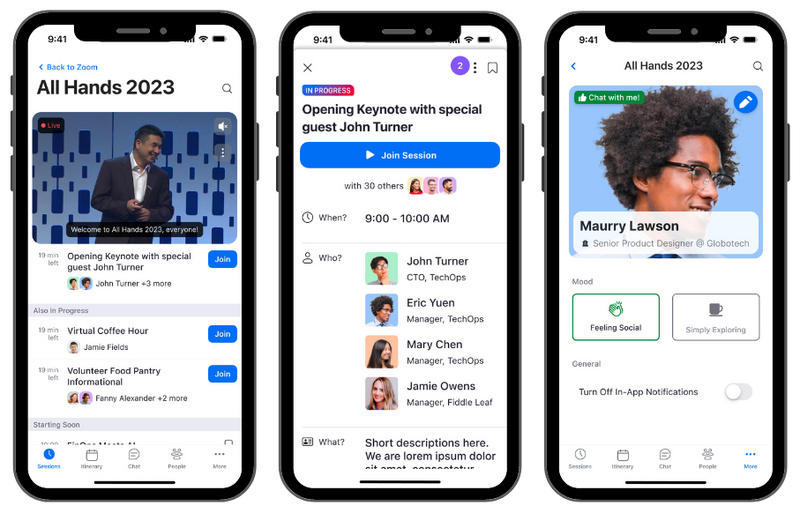
Unique features. Zoom Events provides a built-in production studio that helps you create professional, engaging, and branded virtual events. The studio also supports live streaming events to third-party platforms like YouTube, Facebook, or Vimeo. There’s also the event backstage, which is like a virtual green room where hosts, speakers, and panelists can prepare before going live.
Use cases. Zoom Events' target market is event planners who need an all-in-one platform for hosting and managing virtual conferences with multiple sessions, breakout rooms for networking opportunities, and interactive features.
Pricing. Zoom Events’ pricing starts at $149/month for 100 attendees.

